Puerto Rican environmental defenders denounce repression they face in form of costly fines
Activists opposing the construction of hotels and condominiums on wetlands and beaches say they have been victims of intimidation by courts
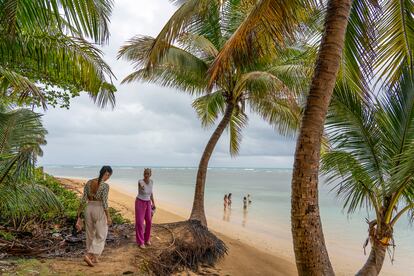

As she walks along the long beach of Punta Bandera, in Luquillo, Puerto Rico, Yanize Elías picks up the garbage she finds. Cigarette butts, product packaging, plastic toys and even cases of DVD porn, who knows how it all got there. She works in a hotel restaurant, but the key thing about her, her passion, is defending the environment and protecting the public lands of the Boricuas. At her side is Johana Santiago, who she met through this movement, through the streets and their own persistence, they say, traveling to different towns across the island to organize actions, protests and campouts whose goal is to protect the public beaches and important ecosystems from developers who want to build on top of them.
But in Puerto Rico, protesting is risky business. Often, demonstrators are arrested or fined, as has happened many times to both Elías and Santiago. “That’s why we are exploring other methods,” says the latter, who has announced her candidacy to represent District 36 with the political party Citizen’s Victory Movement (MVC). In November, Puerto Rico will hold general elections and “the idea is to present the environmental agenda,” Santiago says.
Three years ago, in December 2021, both participated in a battle they lost, but that continues to haunt them: preventing the construction of the Luquillo Hotel Company (LHC), a complex developed by the Puerto Rican business conglomeration Prisa Group that has now become the Fairfield by Marriot Luquillo Beach, in an area that, they point out, is a wetland.
“They began to build the project without warning or anything. Unannounced. They left a kind of covering of trees around it so that you couldn’t see what they were knocking down,” says Elías. But on December 8, once word got around about what was happening, a series of protests and actions took place, lasting across several days. “We demanded that they not build there because it is a wetland,” she says. “We weren’t saying no to the hotel, just to them building it in that area.”
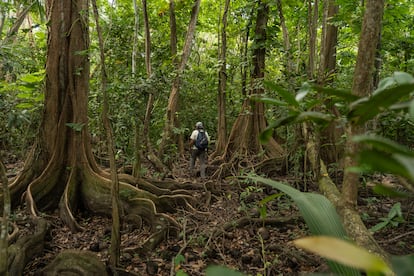
Representatives from Prisa Group and the Marriot did not respond to interview requests from EL PAÍS. But according to reports from local media, they have always argued that they have all the necessary environmental permits to build in the area. When asked about the situation, the Department of Natural and Environmental Resources (DRNA) stated that “the hotel has permits from the United States Army Corps of Engineers and the United States Environmental Protection Agency (EPA).” However, in April 2023, the EPA fined LHC $30,000 for failure to comply with permit notification requirements under the Clean Water Act related to the construction of the project.
A nameless wetland
Roberto Enrique Bello, a.k.a. Roqui, is one of the people who know this wetland best, “although on maps and in politics, they don’t call it that,” he clarifies. With a master’s degree in integrative biology from the University of California, Berkeley, he traverses the area several times a week to look for native plant seeds and bring them to a nursery. “That over there is a dragonsblood tree (Pterocarpus officinalis),” he says, gesturing at a gigantic tree whose roots seem to rise to the same height as a human being, towering over the wetland adjacent to the hotel, which is still in the process of being built. “It is a water-associated species that grows on marshy shorelines,” he adds.
“So how are they going to tell me that this isn’t an important ecosystem?” he asks, unleashing a list of ways in which these wetlands, which have now been fragmented by construction, provide ecosystemic services. “People eat crabs that they catch here, and its trees provide coconut and almonds. In addition, it sequesters carbon,” he says. He takes his phone out of his pocket and opens up a mapping application that shows how the water from these wetlands is fundamental to the hydrological chain that they form, along with the Yunque National Forest (seven-and-a-half miles away) and the ocean (1,200 feet away). “If you reduce the space that people take up, you will also affect that.”
He isn’t the only one saying that there is a wetland here, meaning that no hotel should be built in this area. Héctor Quintero Vilella, who has his doctorate in ecology from Florida State University, believes that there is a large risk in the area due to flooding. Also, after reviewing the environmental studies that the U.S. Army Corps of Engineers approved in giving Prisa Group its building permit, he says he found dozens of errors. “The document has mistakes in its calculations relating to vegetation, hydrology and subsoil,” he says on a video call. “I sent my notes to the Army Corps of Engineers, but basically, when they responded to me, they said that they couldn’t do anything because the hotel was already built,” he says.
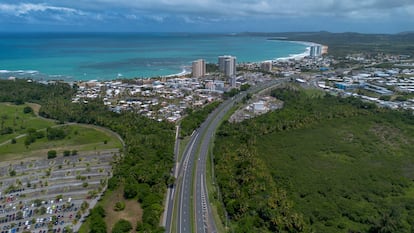
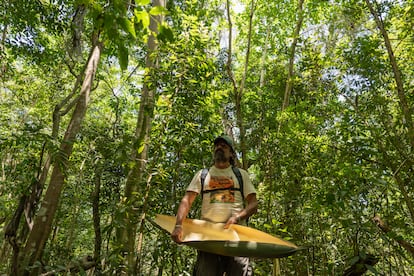
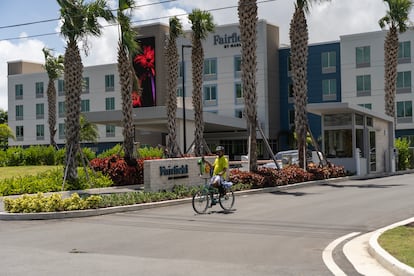
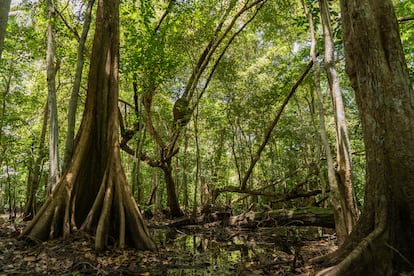
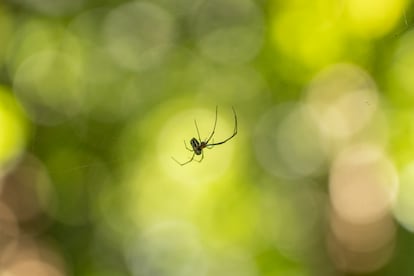
EL PAÍS also reached out to the U.S. Army Corps of Engineers, who referred the request to its office in Puerto Rico. As of publication, they have not issued a response.
Fined for protesting
Elías doesn’t like walking by the Hotel Fairfield by Marriot. He’s not allowed to, either. On December 14, 2021, Santiago and three others, along with “unknown protestors,” were fined by the Court of First Instance Superior Chamber of Fajardo when the hotel claimed they were “blocking access to construction, causing damage to machinery and threatening and assaulting workers.” “There is no interest in them ceasing to exercise their right to express themselves freely, the only thing being requested is the right of the LHC owner to continue its work,” the document states.
After more than two years, Elías insists that she never threatened anyone. She even recounts how someone took the videos that she had recorded of the construction project “and they cut a few seconds so that it looked like I was threatening the owners of the construction company.” Indeed, she says that during the protests, it was the hotel’s security team who was violent with protestors. During that time, Santiago filed a complaint with the police because someone touched his body during the protests.
Although Elías’s case is now closed after she was forced to pay a $500 fine, there are other environmental defenders who continue to be victims of intimidation. The most outrageous case of this is that of Mónica Stamper. As part of the organization Ciudadanos por un Luquillo Resiliente (Citizens for a Resilient Luquillo), the activist filed an injunction asking the courts to detain the hotel’s construction permits while new studies like those of Quintero were carried out. The request, nonetheless, was denied because the court determined that Stamper had no personal interest or property that would be affected by the hotel. And although the case never even made its way to court, the activist received an invoice for more than $40,000 from the hotel group, which it claims was the amount it spent on lawyer fees.
“Without even going to court, they made her pay for Prisa’s lawyer fees. The firm requested that, and the court allowed it,” says Mariana Nogales, spokesperson for the MVC’s members of the House of Representatives. “This is what is known in English as SLAPP suits, strategic litigation against public participation: they create problems to eliminate the freedom of expression.”
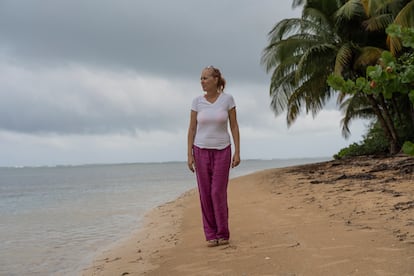
For Nogales, what is happening in Luquillo is just one more aftershock of a series of policies that are empowering contractors and leaving citizens, ecosystems and public beaches evermore unprotected. In addition to the controversial Law 22 of 2012, which granted tax exemptions to foreigners who came to the island promising to invest, there is a piece of earlier legislation, Law 161 of 2009. On paper, its purpose is to “facilitate and promote the integral, social and physical sustainable development of Puerto Rico,” but Nogales believes that what it actually did was facilitate permits for developers and expedite the construction process, avoiding greater oversight. “That law laid the groundwork for deregulating government oversight and privatization,” she says.
The consequences of this can be seen across the island, she adds. “There is corruption in the permit system” and even companies that start to build without legal permission entirely. In 2023, for example, the town of Aguadilla sued the Aguadilla Pier Corp for having built some structures in an area known as Cueva de las Golondrinas. After this, the DRNA forced the firm to demolish them. Elías and Santiago were there, raising their voices in what became known as the Pelícano protest camp. But, once again, both emerged from the protests with charges against them.
In Punta Banderas, Elías and Yanize are looking for a black mangrove that hides in the forest that runs along the beach. It’s enormous and bears a sign that says “árbol campeón” (champion tree) as one of the largest in Puerto Rico. But they prefer that no one know where it is located. “When the companies find out it is here, they will cut it down or poison it, so that it doesn’t bother them,” says Santiago. On this beach, “which is public, of the people,” she says, the hotel group wants to build condominiums. “It is absurd,” she says, showing a sign with the DRNA logo, that proclaims the beach is the site of nests of the leatherback sea turtle, one of the world’s largest species, who prowl the shores of Puerto Rico. The construction of the condominiums is waiting on permits and demarcation. That is why, while they walk along the beach, observe the sea and pick up garbage, these environmentalists say that soon, a new protest camp may be set up on these shores. A new battle will begin.
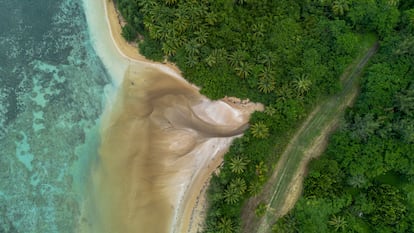
Sign up for our weekly newsletter to get more English-language news coverage from EL PAÍS USA Edition
Tu suscripción se está usando en otro dispositivo
¿Quieres añadir otro usuario a tu suscripción?
Si continúas leyendo en este dispositivo, no se podrá leer en el otro.
FlechaTu suscripción se está usando en otro dispositivo y solo puedes acceder a EL PAÍS desde un dispositivo a la vez.
Si quieres compartir tu cuenta, cambia tu suscripción a la modalidad Premium, así podrás añadir otro usuario. Cada uno accederá con su propia cuenta de email, lo que os permitirá personalizar vuestra experiencia en EL PAÍS.
¿Tienes una suscripción de empresa? Accede aquí para contratar más cuentas.
En el caso de no saber quién está usando tu cuenta, te recomendamos cambiar tu contraseña aquí.
Si decides continuar compartiendo tu cuenta, este mensaje se mostrará en tu dispositivo y en el de la otra persona que está usando tu cuenta de forma indefinida, afectando a tu experiencia de lectura. Puedes consultar aquí los términos y condiciones de la suscripción digital.








































